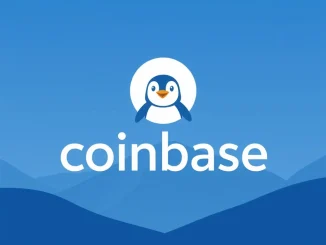
Heads up, crypto traders! Binance, one of the world’s leading cryptocurrency exchanges, has just dropped a bombshell announcement that could impact your trading strategies. Get ready for some changes in the spot trading market as Binance is set to remove several trading pairs. Let’s dive straight into what’s happening and what it means for you.
Binance Delisting Spot Trading Pairs: What’s Going Down?
In a recent announcement on their official website, Binance revealed their plan to delist spot trading pairs involving IDEX (IDEX/BTC), Liquity (LQTY/BTC), and Theta Network (THE/BNB). Mark your calendars because this change is scheduled to take effect on March 14th at 03:00 UTC. This means that after this time, you won’t be able to trade these specific pairs on Binance’s spot market.
Here’s a quick rundown of the affected spot trading pairs:
- IDEX/BTC (IDEX token against Bitcoin)
- LQTY/BTC (Liquity token against Bitcoin)
- THE/BNB (Theta Network token against Binance Coin)
It’s crucial to understand that this Binance delisting only affects these specific spot trading pairs. It doesn’t necessarily mean the complete removal of IDEX, LQTY, or THE tokens from the Binance platform. You might still be able to trade these tokens in other pairs, if available, or withdraw them from the exchange.
Why is Binance Delisting These Trading Pairs?
Binance regularly reviews listed spot trading pairs to ensure a high level of quality and protect users. Delisting is a standard practice in the crypto exchange world. Exchanges like Binance monitor factors such as trading volume, liquidity, and overall market conditions to make these decisions. While Binance hasn’t explicitly stated the reasons for delisting IDEX/BTC, LQTY/BTC, and THE/BNB, here are some common factors that often lead to such actions:
- Low Trading Volume and Liquidity: If a trading pair consistently exhibits low trading volume and poor liquidity, it becomes less attractive for traders and can be costly for the exchange to maintain. Delisting such pairs can streamline the trading platform and concentrate liquidity in more active markets.
- Project Development and Health: Exchanges also consider the overall health and development of the underlying projects. If a project shows signs of stagnation, decreased activity, or potential risks, the exchange might decide to delist its trading pairs to protect users from potential losses.
- Regulatory Compliance: In the ever-evolving regulatory landscape of cryptocurrencies, exchanges must adhere to various compliance standards. Changes in regulations or concerns about a particular token’s compliance status could also lead to delisting.
What Should Traders Do About These Spot Trading Pairs?
If you are currently holding positions in IDEX/BTC, LQTY/BTC, or THE/BNB spot trading pairs on Binance, it’s essential to take immediate action. Here’s a step-by-step guide:
- Close Your Positions: Binance strongly advises users to close their positions in these trading pairs before the delisting date, March 14th, 03:00 UTC.
- Cancel Open Orders: Any pending trade orders for IDEX/BTC, LQTY/BTC, and THE/BNB will be automatically canceled by Binance after the delisting. However, it’s always a good practice to manually cancel them yourself to ensure everything is clear.
- Explore Alternative Options: If you still wish to trade IDEX, LQTY, or THE, investigate if they are available in other trading pairs on Binance or other exchanges. For example, you might find IDEX/USDT or LQTY/USDT pairs still active.
- Consider Token Withdrawal: If you want to hold these tokens long-term, consider withdrawing them to a personal wallet that supports these cryptocurrencies. This gives you full control over your assets.
Impact of Binance Delisting on IDEX, LQTY, and THE
Binance delisting announcements often trigger price volatility for the affected cryptocurrencies. Historically, delisting from major exchanges can lead to a decrease in price and trading volume, at least in the short term. Traders should be prepared for potential price fluctuations in IDEX, LQTY, and THE as the delisting date approaches. However, the long-term impact will depend on various factors, including the overall market sentiment, the strength of the underlying projects, and their adoption rates.

Key Takeaways on Binance Spot Trading Pairs Delisting
This Binance delisting event serves as a crucial reminder of the dynamic nature of the cryptocurrency market. Exchanges are constantly evaluating their offerings to maintain a healthy and efficient trading environment. For traders, it underscores the importance of:
- Staying Informed: Regularly check announcements from exchanges you use to stay updated on any changes, including delistings, new listings, or changes in trading rules.
- Managing Risk: Diversify your portfolio and avoid overexposure to any single cryptocurrency or trading pair, especially those with lower liquidity or higher risk profiles.
- Being Proactive: When delisting announcements are made, act promptly to close positions and adjust your trading strategies to mitigate potential losses.
Navigating Crypto Market Changes
The cryptocurrency market is known for its rapid pace of change. Spot trading pairs come and go, projects evolve, and market conditions shift. Staying adaptable and informed is key to successfully navigating this exciting but volatile space. Keep an eye on official exchange announcements and reputable crypto news sources to remain ahead of the curve and make informed trading decisions.
In conclusion, the upcoming Binance delisting of IDEX/BTC, LQTY/BTC, and THE/BNB spot trading pairs is a significant event for traders involved with these assets. By understanding the implications and taking timely action, you can effectively manage your positions and continue to thrive in the ever-changing world of crypto trading. Don’t panic, stay informed, and adjust your sails!



